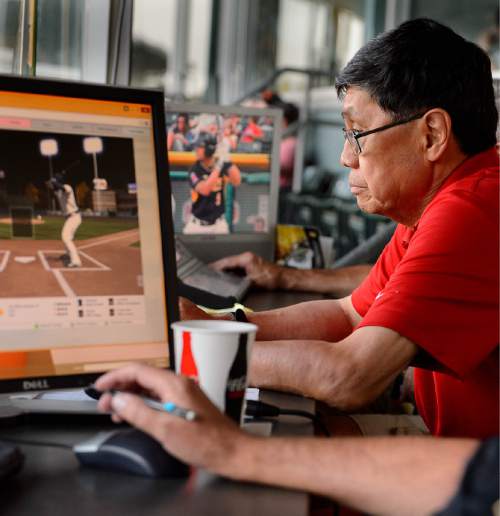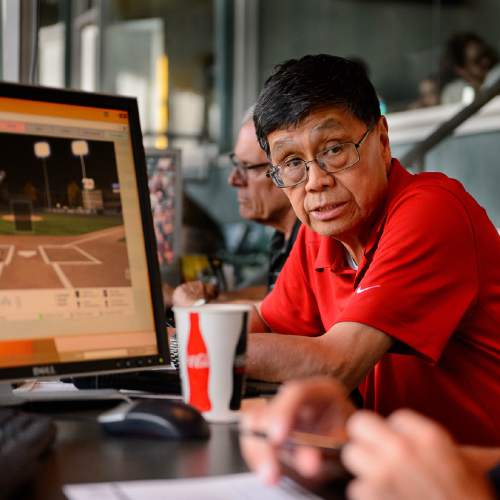This is an archived article that was published on sltrib.com in 2016, and information in the article may be outdated. It is provided only for personal research purposes and may not be reprinted.
When Howard Nakagama has to confront a 50-50 call from the Smith's Ballpark press box, a few thoughts always go through his head: 'Have I seen this play before? 'Do I have enough grounds to side one way or the other?' And, 'What does the rulebook say? '
So it goes for the SaltLake Bees' official scorekeeper, who has been ruling on hits and errors, and other plays, at Buzz/Stingers/Bees games for the past two decades (along with a few other folks who have also done the job along the way).
Every home game, with score sheet and pen in hand, Nakagama keeps track of the pitch count, errors, and of course, the score, as a part-time job that lasts between three and four hours a night. He's quick to tell you it's no terribly exciting. But it is baseball, and it's Nakagama's love for the game that keeps him coming back to the diamond time and time again.
"It's not a job – I don't view the pressure as being pressure – I just like being around baseball people," Nakagama said. "You don't do it for the money, you're basically doing it for the passion of it."
Yet, scorekeeping at the Triple-A level also is a critical job. They make a difference, whether a pitcher gets tagged with a hit instead of an error, or a hitter gets aboard on an error instead of a hit. In either case, ERAs and batting averages can be affected — as Nakagama and his fellow scorekeepers are well aware.
"I don't think we understand how tough of a job it is," Bees second baseman Sherman Johnson said. "There's little things that happen out here on the field — we see that — but he's looking from up there … it's tougher than we imagine."
Nakagama's scoring decision process usually starts with an initial declaration of what the play might be and ends with Nakagama arriving at his decision — sometimes with the help of experienced co-workers in the pressbox, other times by consulting the rulebook. Sometimes, Nakagama simply goes with his gut feeling — an instinct developed over years of watching hundreds of professional baseball games.
"You never get comfortable with it because no two plays are exactly the same," he said. "I realize that the player's careers may be dependent on a judgment that you make …"
Over 20 years later, Nakagama's process has become his scorekeeping system. And it's a tough habit to shake. Even when he's off the clock.
"I've probably watched the game through different eyes than the regular fan for a long time," Nakagama said. "I can't tell you the last time I've casually watched a game …"
Scorekeeping at the Triple-A level isn't a glamorous job. In fact, a scorekeeper's untimate goal is to not be noticed. If they're not, it means they've done their job.
"Obliviously it's a guy that has a vested opinion in the game, someone that likes the purity of the game, likes to see the game played at a high quality," Bees manager Keith Johnson said. "There has to be a level of admiration there: for someone who's willing to put their word on the line on a nightly basis for three hours, everything they say is going to be looked at with fine tooth comb."
For veteran scorekeepers like Nakagama, that's about as good as it gets.









